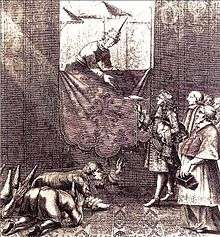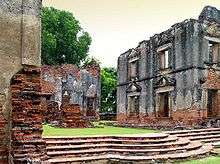Constantine Phaulkon


Constantine Phaulkon, born Κωσταντής Γεράκης or Costantin Gerachi[1] (Greek: Κωνσταντῖνος Γεράκης, Konstantinos Gerakis, "γεράκι", is the word for "falcon") also known by the French simply as Monsieur Constance, the Thai noble title เจ้าพระยาวิชาเยนทร์, Chao Phraya Wichayen and the Portuguese Constantino Falcão (1647 – June 5, 1688) was a Greek adventurer, who became prime counsellor to King Narai of Ayutthaya,[2] assuming the title Chao P'raya Vichayen.[3]:59,64
Born within the fortress of Asso in the region of Erisso (pertinenza di Erisso) on northern Cephalonia (then under Venetian rule) to Greek Orthodox parents. The Γεράκη / Gerachi (Gerakis) family was already established there, in the village of Plagia (Πλαγιά), since the 16th century.[4][5] Phaulkon came to Siam (today's Thailand) as a merchant in 1675 after working for England's East India Company. He became fluent in Thai in just a few years and began to work at the court of King Narai as a translator (he was also fluent in English, French, Portuguese, and Malay). Due to his experience with the East India Company, he was soon able to become a prime counsellor of the king. He worked in the Treasury.[6]
In 1682, Phaulkon abandoned Anglicanism for Catholicism[7]:254–265 and soon after married a Catholic woman of mixed Japanese-Portuguese-Bengali descent named Maria Guyomar de Pinha.[8][9] They lived a life of affluence as Phaulkon rose to become highly influential at the Siamese court of king Narai. Their marriage brought two sons, João and Jorge, the first of whom died before their father.[10]
Following troubles with the English and the Dutch, Phaulkon engineered a Franco-Siamese rapprochement leading to the exchange of numerous embassies between France and Siam, as well as the dispatch of an expeditionary force by the French in 1687. Phaulkon, called Monsieur Constance by the French and addressed Cher ami by their king, was their main ally for several years. In recognition king Louis XIV of France awarded him with the knighthood of the Order of Saint Michael, a hereditary title in the French nobility as well as the French citizenship for him and his family.[11]
The Abbé de Choisy, who was part of the first French embassy to Thailand in 1685, wrote about M. Phaulkon's character:
"He was one of those in the world who have the most wit, liberality, magnificence, intrepidity, and was full of great projects, but perhaps he only wanted to have French troops in order to try and make himself king after the death of his master, which he saw as imminent. He was proud, cruel, pitiless, and with inordinate ambition. He supported the Christian religion because it could support him; but I would never have trusted him in things in which his own advancement was not involved"
Phaulkon's closeness to the king naturally earned him the envy of some Thai members of the royal court, which would eventually prove to be his undoing. When King Narai became terminally ill, a rumor spread that Phaulkon wanted to use the designated heir, Phra Pui, as a puppet and actually become ruler himself. As unlikely as this was, it provided an excuse for Pra Phetracha, the foster brother of Narai to stage a coup d'état, the 1688 Siamese revolution. Without the king's knowledge, both Phaulkon and his followers as well as the royal heir were arrested and executed on June 5, 1688 in Lopburi. When King Narai learned what had happened, he was furious—but was too weak to take any action. Narai died several days later, virtually a prisoner in his own palace. Phetracha then proclaimed himself the new king of Siam and began a xenophobic regime which expelled almost all foreigners from the kingdom.
The different interpretations of Phetracha's motivation for ordering the arrest and execution of Phaulkon have made the Greek's position in Thai history somewhat controversial. Supporters of Phetracha's actions have depicted Phaulkon as an opportunistic foreigner who sought to use his influence to control of the kingdom on behalf of Western interests. More skeptical historians believe that Phaulkon was simply a convenient scapegoat - a means for Phetracha to seize the throne from the rightful heir by capitalizing on the envy and suspicion Phaulkon had engendered.
Notes
- ↑ These are the Greek and Italian spelling forms of his name and family name as found in local archives of Cephalonia. Cangelaris 2011, pp.66-68
- ↑ When Bangkok was just a French fort
- ↑ Chakrabongse, C., 1960, Lords of Life, London: Alvin Redman Limited
- ↑ Cangelaris 2011, pp.67, 89-91
- ↑ Cangelaris - Kefalonitiki Proodos No.3, pp.14-18
- ↑ http://www.cosmicelk.net/eclipsesinSiam.pdf
- ↑ Rajanubhab, D., 2001, Our Wars With the Burmese, Bangkok: White Lotus Co. Ltd., ISBN 9747534584
- ↑ Smithies 2002, p.100
- ↑ Smithies, p.183
- ↑ Cangelaris 2011, p.91
- ↑ Cangelaris - Kefalonitiki Proodos No.7, pp.36-38
- ↑ Quoted in Smithies 2002, p.12
References
- Smithies, Michael (2002), Three military accounts of the 1688 "Revolution" in Siam, Itineria Asiatica, Orchid Press, Bangkok, ISBN 974-524-005-2
- Cangelaris, P.D. (2011), History and Genealogy of the Cangelari Family of Cephalonia (16th-20th Centuries), Corfu 2011, (in Greek), ISBN 978-960-85532-2-4
- Cangelaris - Kefalonitiki Proodos No.3: Παναγιώτης Δ. Καγκελάρης, "Κωσταντής Γεράκης (Constance Phaulkon) - Μια νέα γενεαλογική προσέγγιση", from: Η Κεφαλονίτικη Πρόοδος, Περίοδος Β', τεύχος 3 (Ιούλιος-Σεπτέμβριος 2012) (in Greek)
- Cangelaris - Kefalonitiki Proodos No.7: Παναγιώτης Δ. Καγκελάρης, "Το γαλλικό οικόσημο του πρωτοσύμβουλου Κωσταντή Γεράκη (Constance Phaulkon)", from: Η Κεφαλονίτικη Πρόοδος, Περίοδος Β', τεύχος 7 (Ιούλιος-Σεπτέμβριος 2013) (in Greek)
External links
| Wikimedia Commons has media related to Constantine Phaulkon. |
- George A. Sioris, Phaulkon - The Greek First Counsellor at the Court of Siam: An Appraisal, Bangkok 1988 ISBN 974-8298-41-8.
- Memoires de Siam - Les personnages - Phaulkon, Monsieur Constance (in French)
- Panayotis D. Cangelaris: "Costantin Gerachi (Constance Phaulkon) - A new genealogical approach" (reprint in Greek)
- Panayotis D. Cangelaris: "The French coat of arms of prime counsellor Costantin Gerachi (Constance Phaulkon)" (reprint in Greek)
